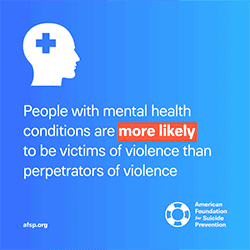Mental Illness Does Not Cause Mass Shootings
Mental Illness Does Not Cause Mass Shootings
With the recent shootings in El Paso and Dayton, the role of mental illness in mass shootings has been brought up by many notable figures.
Let’s dispel one myth right away: the vast majority of those with mental illness are not violent or likely to become that way. See our myth-busting article here.
Through pop culture references, certain Halloween traditions, scary movies, and the media, our society’s stigma surrounding mental illness persists. It’s easy, then, to blame those with mental illness when a mass shooting happens. By lumping the scary and mysterious together, we are, in effect, sweeping the issue under the rug instead of taking accountability and action to effectively address the problem.

Yet we don’t even need to rely on our own experiences; researchers are studying the relationship between mental illness and mass shootings. Their findings show again and again that mass shootings are not the result of mental illness (or video games – another common scapegoat):
-
- A 2015 study found that “the large majority of people with mental disorders do not engage in violence against others, and that most violent behavior is due to factors other than mental illness.”
- Another study completed in 2016 shows that, “mass shootings by people with serious mental illness represent less than 1% of all yearly gun-related homicides.”
- Being a young man is a greater predictor of violent behavior than being mentally ill, one study showed.
Through continued research into the causes of mass shootings and a greater understanding of mental health, real change can take place. Until then, spread awareness!
Share this article or follow PDG by clicking the social media links below!
